10 Ways to Eat for Abs

What foods support loss of belly fat, or help keep off the weight? Come along with me, and let's take a look! My name is Annette Snyder, and I've been a registered dietitian (RD) for nearly 20 years, now working with Top Nutrition Coaching. I've had extensive experience in the practice areas of weight management, diabetes care, and digestive disorders. I currently maintain additional board certification (CSOWM) in weight management through the Commission on Dietetic Registration, the credentialing body for the Academy of Nutrition and Dietetics. I'm passionate about the new things nutrition science is teaching us. My goal is sharing that knowledge in a way that inspires others to get curious about their health. The foods that support intended weight loss share some qualities in common (1-3). They tend to be higher in fiber, contain a decent amount of protein, and fewer inflammatory fats (saturated). Read on for my list of 10 ways to eat for abs.
Fruits and Veggies
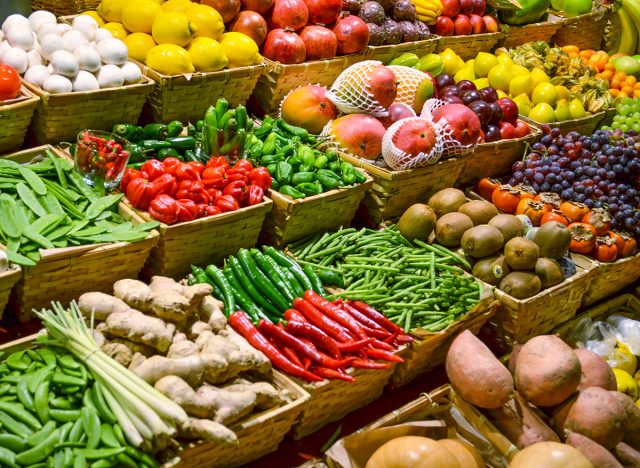
This is a no-brainer. A number of scientific studies (4) have suggested links to eating more produce, especially veggies, with lower risk of gaining weight and lower waist circumference. Plus, you know, you get vitamins and minerals. Bonus!
Whole Grains
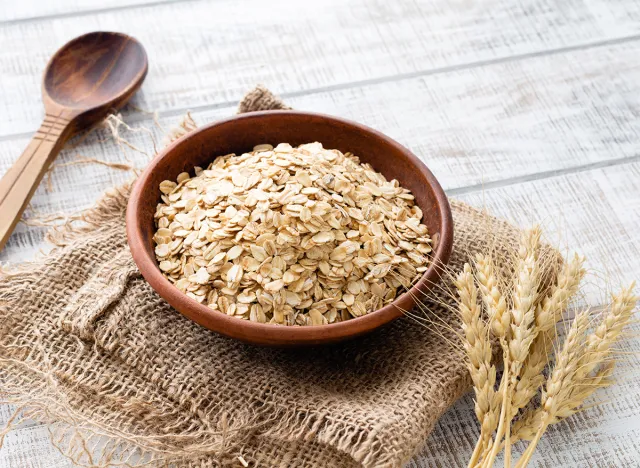
These include oats, buckwheat, quinoa, barley and others. While they're full of gut-friendly fiber, vitamins, minerals, and antioxidants, they also help manage blood sugar. Keeping your blood sugar in check means you deal with fewer mid-afternoon cravings (5) for all things carb. Whole grains have also been associated with appetite control and can affect how the body uses energy (calories) from food (6).
Related: How I Shed 99 Pounds Naturally With These 4 Changes
Heart-Healthy Fats
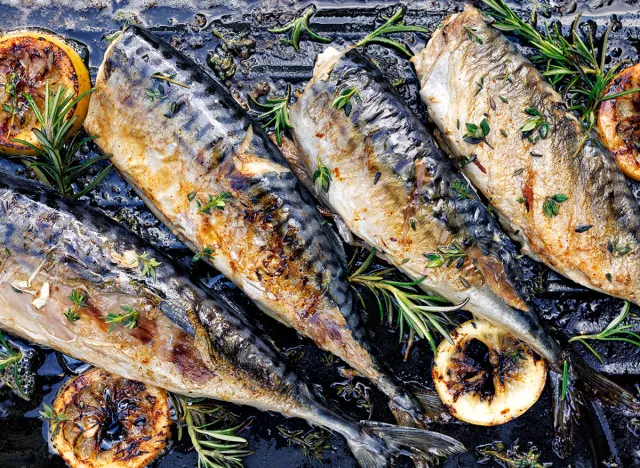
Heart-healthy fats from fish (like tuna, mackerel, salmon), in addition to calming inflammation in the body, have a role in weight control by promoting lower belly fat and unhealthy triglyceride levels (blood fats) (7). Fish is also a rich protein source, which is important in maintaining muscle mass. Protein has been linked to reduced appetite (8) along with fiber.
Nuts and Seeds
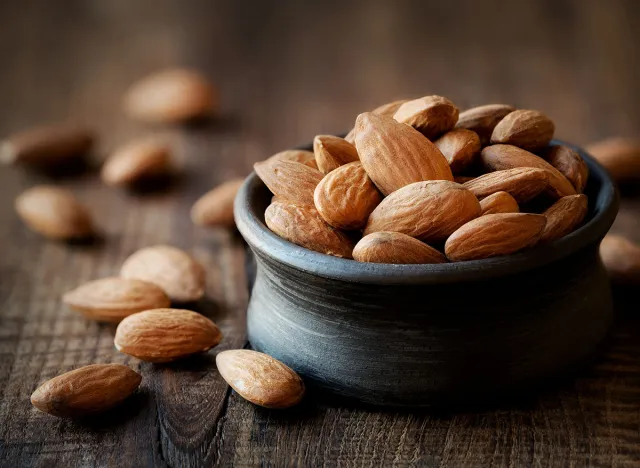
Not to be outdone in the nutrient department, nuts and seeds provide boosts of fiber, protein, and healthy fats. Various smaller studies have observed reductions in belly fat and/or waist circumference when consuming almonds (9) or chia (10), for example. There are tons of options—pumpkin seeds, sunflower seeds, walnuts, pistachios, just to name a few—and they're great for snacking!
Green Tea
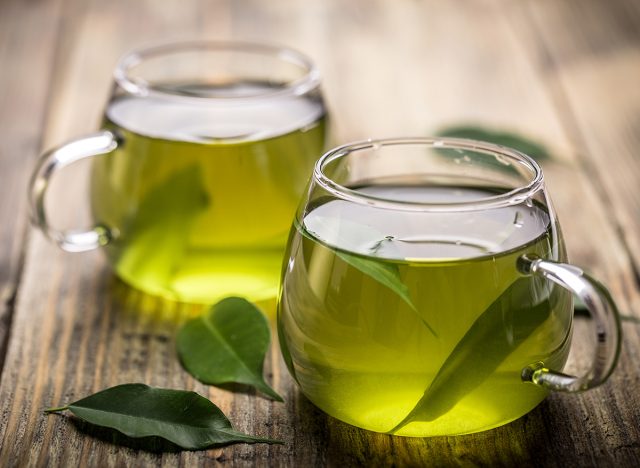
Green tea has also entered the conversation. It contains the compound EGCG, which has been observed to bump up your calorie burn (11). Various studies have also found loss of belly fat and waist circumference with regular intake of green tea (12). Aside from EGCG, green tea is loaded with antioxidants.
Keep Your Gut Happy With Probiotics
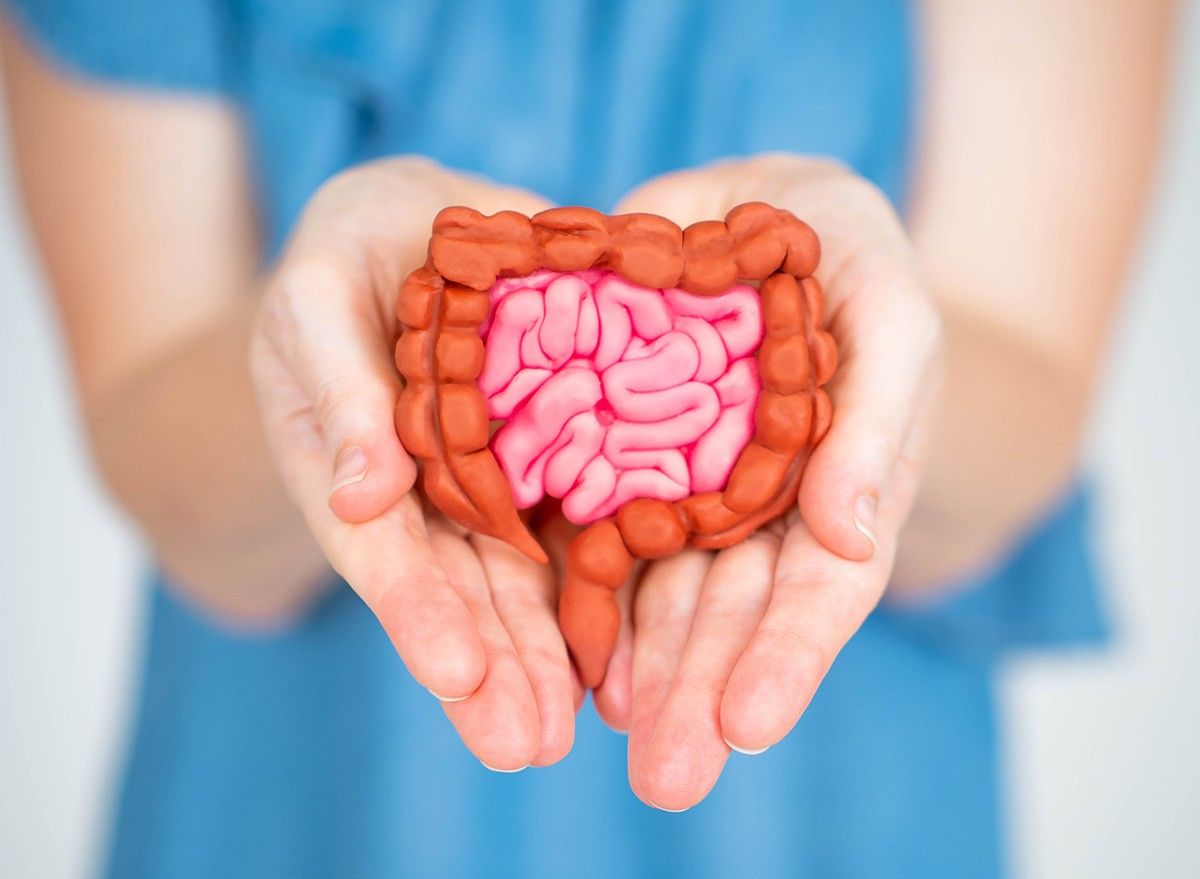
What about the bacteria in our digestive tract? They play a role, too! More studies in recent years (13) have identified the role of our microbiome in appetite as well as metabolism. At present, we continue to investigate what those microbes are doing that has those effects. Various strains such as Lactobacillus and Bifidobacterium have been looked at (14) more closely for a possible link in weight loss—stay tuned. In the meantime, keep your gut happy with some probiotics from food: kefir, yogurt, kimchi, sauerkraut, and aged cheeses are some great sources.
Related: The #1 Thing to Eat for Weight Loss, Says Woman Who Dropped 50 Pounds
Hydrate Right

How about your hydration? Do you drink enough fluid (especially water) on a daily basis? Your body uses water in its day-to-day function to perform tasks like burning calories. It's kind of like the oil that makes the machine work better. A study on hydration and health in older adults (15) found a strong link between low fluid intake/dehydration and increased occurrences of weight gain, high waist circumference, insulin resistance, diabetes, low HDL (good) cholesterol, high blood pressure, and metabolic syndrome. Drink up!
Think About How You Eat, Not Just What You Eat

Aside from what we eat and drink (or don't), how we eat can have a big impact. Are you known for finishing your meal well before everyone else at the table? (Do you taste your food?) Take a pause. Slowing down actually lets your body do its thing and send you the message that you have taken in enough fuel (calories). You cruise right on by that point and don't hear the message when you rush the process—resulting in eating more calories than you actually need.
Avoid Added Sugars
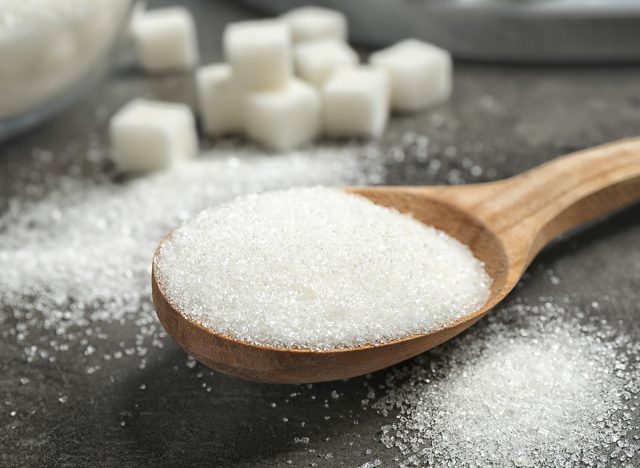
Of course, I'm going there: we tend to eat too much added sugar. Added sugar (vs naturally-occurring sugar in things like fruit or milk) has number of drawbacks. Added sugars don't add nutrition. Our bodies aren't set up to process the large quantities we are capable of ingesting, and figuring out what to do with that extra fuel is where we see fat storage start. A large review of the available studies aimed to determine what happens with excess sugar intake (16), and it ain't pretty. Significant links between sugar intake and higher weight, along with a host of other conditions such as heart disease and depression, have been suggested. Sugar-sweetened drinks are the biggest culprit: soda, fruit drinks, sweet tea, and coffee drinks. (As a coffee lover myself, that last one hits hard.)
Related: What Happens When You Quit Soda, According to a Nutritionist
Avoid Alcohol

Alcohol has been linked to belly fat for quite some time now. Various studies have found links between drinking and increased waist circumference (17), especially if consuming in larger quantities (18). Calories from alcohol are not stored like carbohydrates (19) (glycogen); rather the body stores them as fat. Essentially, alcohol offers calories, just like added sugars, and no nutrition benefit.
Final Word From the Expert

While a number of foods can provide benefits that support weight loss, it's important to remember that you don't eat in a vacuum. What do I mean? Eating more almonds while living on fast food isn't going to do the job. Get your house in order with all of your food and drink choices to see real results. If you enjoyed this article, don't miss out on 4 Incredible Ways Your Body Changes When Intermittent Fasting.
Cited References
- Schutte S, Esser D, Siebelink E, et al. Diverging metabolic effects of 2 energy-restricted diets differing in nutrient quality: a 12-week randomized controlled trial in subjects with abdominal obesity. Am J Clin Nutr. 2022;116(1):132-150. doi:10.1093/ajcn/nqac025
- Barnard ND, Goldman DM, Loomis JF, et al. Plant-Based Diets for Cardiovascular Safety and Performance in Endurance Sports. Nutrients. 2019;11(1):130. Published 2019 Jan 10. doi:10.3390/nu11010130
- Paixão C, Dias CM, Jorge R, et al. Successful weight loss maintenance: A systematic review of weight control registries. Obes Rev. 2020;21(5):e13003. doi:10.1111/obr.13003
- Nour M, Lutze SA, Grech A, Allman-Farinelli M. The Relationship between Vegetable Intake and Weight Outcomes: A Systematic Review of Cohort Studies. Nutrients. 2018;10(11):1626. Published 2018 Nov 2. doi:10.3390/nu10111626
- Njike VY, Smith TM, Shuval O, et al. Snack Food, Satiety, and Weight. Adv Nutr. 2016;7(5):866-878. Published 2016 Sep 15. doi:10.3945/an.115.009340
- Karl JP, Meydani M, Barnett JB, et al. Substituting whole grains for refined grains in a 6-wk randomized trial favorably affects energy-balance metrics in healthy men and postmenopausal women [published correction appears in Am J Clin Nutr. 2017 Aug;106(2):708]. Am J Clin Nutr. 2017;105(3):589-599. doi:10.3945/ajcn.116.139683
- Karlsson T, Rosendahl-Riise H, Dierkes J, Drevon CA, Tell GS, Nygård O. Associations between fish intake and the metabolic syndrome and its components among middle-aged men and women: the Hordaland Health Study. Food Nutr Res. 2017;61(1):1347479. Published 2017 Jul 13. doi:10.1080/16546628.2017.1347479
- Weigle DS, Breen PA, Matthys CC, et al. A high-protein diet induces sustained reductions in appetite, ad libitum caloric intake, and body weight despite compensatory changes in diurnal plasma leptin and ghrelin concentrations. Am J Clin Nutr. 2005;82(1):41-48. doi:10.1093/ajcn.82.1.41
- Berryman CE, West SG, Fleming JA, Bordi PL, Kris-Etherton PM. Effects of daily almond consumption on cardiometabolic risk and abdominal adiposity in healthy adults with elevated LDL-cholesterol: a randomized controlled trial. J Am Heart Assoc. 2015;4(1):e000993. Published 2015 Jan 5. doi:10.1161/JAHA.114.000993
- Tavares Toscano L, Tavares Toscano L, Leite Tavares R, da Oliveira Silva CS, Silva AS. Chia induces clinically discrete weight loss and improves lipid profile only in altered previous values. Nutr Hosp. 2014;31(3):1176-1182. Published 2014 Dec 14. doi:10.3305/nh.2015.31.3.8242
- Kapoor MP, Sugita M, Fukuzawa Y, Okubo T. Physiological effects of epigallocatechin-3-gallate (EGCG) on energy expenditure for prospective fat oxidation in humans: A systematic review and meta-analysis. J Nutr Biochem. 2017;43:1-10. doi:10.1016/j.jnutbio.2016.10.013
- Hibi M, Takase H, Iwasaki M, Osaki N, Katsuragi Y. Efficacy of tea catechin-rich beverages to reduce abdominal adiposity and metabolic syndrome risks in obese and overweight subjects: a pooled analysis of 6 human trials. Nutr Res. 2018;55:1-10. doi:10.1016/j.nutres.2018.03.012
- Diener C, Qin S, Zhou Y, et al. Baseline Gut Metagenomic Functional Gene Signature Associated with Variable Weight Loss Responses following a Healthy Lifestyle Intervention in Humans. mSystems. 2021;6(5):e0096421. doi:10.1128/mSystems.00964-21
- Álvarez-Arraño V, Martín-Peláez S. Effects of Probiotics and Synbiotics on Weight Loss in Subjects with Overweight or Obesity: A Systematic Review. Nutrients. 2021;13(10):3627. Published 2021 Oct 17. doi:10.3390/nu13103627
- Stookey JD, Kavouras SΑ, Suh H, Lang F. Underhydration Is Associated with Obesity, Chronic Diseases, and Death Within 3 to 6 Years in the U.S. Population Aged 51-70 Years. Nutrients. 2020;12(4):905. Published 2020 Mar 26. doi:10.3390/nu12040905
- Huang Y, Chen Z, Chen B, et al. Dietary sugar consumption and health: umbrella review. BMJ. 2023;381:e071609. Published 2023 Apr 5. doi:10.1136/bmj-2022-071609
- Ryu M, Kimm H, Jo J, Lee SJ, Jee SH. Association between Alcohol Intake and Abdominal Obesity among the Korean Population. Epidemiol Health. 2010;32:e2010007. Published 2010 May 19. doi:10.4178/epih/e2010007
- Zakhari S. Overview: how is alcohol metabolized by the body?. Alcohol Res Health. 2006;29(4):245-254.




